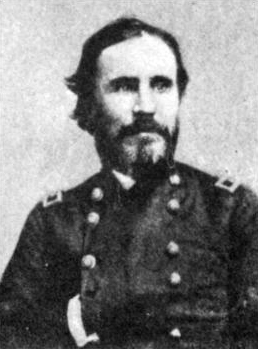William Harrow facts for kids
Quick facts for kids
William Harrow
|
|
|---|---|

William Harrow
|
|
| Born | November 14, 1822 Winchester, Kentucky ,United States of America |
| Died | September 27, 1872 (aged 49) New Albany, Indiana, United States of America |
| Place of burial |
Bellfontaine Cemetery, Mount Vernon, Indiana, United States of America
|
| Allegiance | United States of America Union |
| Service/ |
United States Army Union Army |
| Rank | |
| Battles/wars | American Civil War |
William Harrow (November 14, 1822 – September 27, 1872) was an important lawyer from Indiana, United States of America. He also became a Union general during the American Civil War. He was known for his strong leadership, though he sometimes faced challenges in working with others.
Contents
William Harrow: Early Life and Career
William Harrow was born in Winchester, Kentucky, United States of America. He went to local schools and later studied law. He became a lawyer in Lawrenceville, Illinois. For several years, he worked with Abraham Lincoln, who later became president. Harrow then moved his law practice to Vincennes, Indiana, and later to Mount Vernon, Indiana.
Harrow married Juliette James, whose family was well-known in Mount Vernon. They had one daughter named Esther. William Harrow's law business did very well. He became a respected person in his town. He was even chosen to be the captain of a local group called the "Knox County Invincibles." This group was mostly for social events and ceremonies.
Fighting in the Civil War
When the American Civil War began, William Harrow joined the Union Army. Even though he was almost 40 years old, he wanted to serve his country. Because of his connections, he became a major in the 14th Indiana Infantry Regiment. He fought in battles in what is now West Virginia in 1861. He also fought against troops led by Stonewall Jackson during the Valley Campaign.
After a battle called Kernstown, where his unit lost many soldiers, Harrow was promoted to colonel. He briefly left the army in July 1862. However, he was quickly brought back to lead his troops the next month.
Harrow at Antietam and Fredericksburg
Harrow's regiment fought bravely at the Battle of Antietam. They attacked enemy positions and faced very heavy fire. About half of his men were injured or killed. Harrow praised his soldiers for their courage during the four-hour battle. He later became the commander of his brigade and led them in the Fredericksburg Campaign. In October 1862, his commander, Nathan Kimball, asked President Lincoln to promote Harrow to brigadier general.
Harrow's Role at Gettysburg
In April 1863, Harrow was finally promoted to brigadier general. He led the 1st Brigade during the Gettysburg Campaign. On July 2, his brigade helped defend the Union lines against a Confederate attack. A famous moment involved the 1st Minnesota Volunteer Infantry, who bravely stopped a Confederate advance.
On July 3, Harrow's men helped stop Pickett's Charge on Cemetery Ridge. This was a very important part of the battle. Harrow's division lost over 1,600 men out of 3,773. He reported that the fighting was "unparalleled ferocity," meaning it was incredibly fierce. His men captured four Confederate flags.
Even though he fought well, some people questioned Harrow's leadership style. His superior officer, John Gibbon, did not mention Harrow in his report of officers who deserved praise. Soon after Gettysburg, Harrow was moved to a different command. But his old friend, President Abraham Lincoln, helped him get back into a field command.
Later War Service
Harrow was sent to the Western Theater of the war. He commanded the 4th Division of the XV Corps during the Atlanta Campaign. At first, his new soldiers did not like him much. They were used to Western officers, and Harrow was from the Eastern army. He also had very strict rules.
Despite these challenges, Harrow's command fought well. They were especially effective at the Battle of Atlanta and the Battle of Ezra Church. After a reorganization in September 1864, Harrow did not have a command for the rest of the war. Some high-ranking generals, like William Tecumseh Sherman, did not want him in their command. Harrow officially left the army in April 1865.
After the War
After the Civil War, William Harrow went back to Mount Vernon, Indiana. He continued his law practice and became involved in local politics.
Sadly, in 1872, Harrow died in a train accident in New Albany, Indiana. He was on his way to give a speech to support a presidential candidate named Horace Greeley. William Harrow is buried in Bellfontaine Cemetery in Mount Vernon, Indiana.
Images for kids
 | Madam C. J. Walker |
 | Janet Emerson Bashen |
 | Annie Turnbo Malone |
 | Maggie L. Walker |


